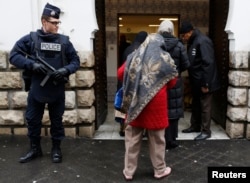Nearly three months after the November terrorist attacks in Paris and after weeks of debates and protests, French lawmakers began Friday to examine legislation to beef up security laws, including hotly-disputed proposals to amend the country’s constitution.
National Assembly deputies are expected to vote on some of the proposed reforms next Wednesday. If passed, they will then be taken up by the Senate. But the outcome of the package is far from certain.
Two of the most controversial measures — writing the state of emergency into the constitution along with text to strip French nationality from convicted terrorists and others who threaten the nation’s “interests” — have sparked a firestorm of protest and bitterly split French President Francois Hollande’s Socialist party.
In a National Assembly address Friday morning, Prime Minister Manuel Valls argued forcefully in favor or the measures, noting the two major terrorist attacks in Paris last year that together killed nearly 150 people.
“The fight against radicalization will be the task of a generation,” Valls said, adding the French public are demanding their elected officials to do “everything for their protection.”
Put in place on the night of the November 13 attacks, France’s state of emergency has already been extended once and is set to expire on February 26. Experts expect it will be extended, giving time to pass the proposed reforms.
Among other things, the emergency powers allow French police to carry out raids and put people under house arrest without prior authorization by a judge.
Supporters argue the government’s push to write the emergency powers into the constitution would make it easier for authorities to respond to current and future threats. On Friday, Valls said the emergency powers have helped authorities to “destabilize” jihadist networks and thwart at least one recent planned attack.
But they have also unleashed public protests and harsh criticism by rights groups.
Angry objections
Reports released this week by Human Rights Watch and Amnesty International France assert that the several thousand raids carried out by police since the November attacks have trampled on basic rights and made little difference in fighting terrorism.
Muslims in particular have been unfairly targeted, the groups say, citing interviews of people who described having their homes looted, getting hit by police and being unfairly confined to house arrest.
“Some people said they were targeted because they were wearing beards or because they were praying too much,” said Amnesty campaigner Dominique Curis, who called the measures “completely disproportionate.”
Even more controversial, perhaps, is a second proposal to strip the nationality from French people convicted of terrorism and other crimes “that threatened the fundamental interests of the French nation.”
The measure sparked last week’s resignation of Justice Minister Christiane Taubira, who tweeted that “sometimes resisting means leaving.” She was replaced by Jean-Jacques Urvoas, considered a supporter of the reform.
Under current law, convicted terrorists who acquired French nationality within the past 15 years can lose it. The draft legislation would go further and theoretically apply to all French citizens in a messy bid to appear even-handed and win support from leftist critics. Yet since the government says nobody should be made stateless, it would ultimately apply only to those with dual citizenship.
Polls suggest most French broadly back the measure, which has also drawn support from some leading conservative lawmakers, including former president Nicolas Sarkozy.
Yet it has also sparked alarm by many leading politicians and academics. In an open letter published in Le Monde newspaper this week, more than a dozen of them urged lawmakers to reject the proposed amendment, arguing it was useless, vague, inept and would encourage racism. Indeed, media reports suggest only two of the terrorists who attacked France in recent years would be qualified to lose their citizenship under the reform.
“This proposal is absurd. It doesn’t deter any terrorist,” said historian Patrick Weil, who helped to spearhead the open letter. “It divides society when it’s exactly the opposite that we need.”
Will the measures pass?
The citizenship measure has also deeply divided Hollande’s own governing party. “I hope the stripping of nationality will not be written into the constitution,” former minister Taubira told Le Monde, adding that she sensed a “dynamic” among leftist lawmakers to reject it.
Even some conservative lawmakers have reservations about the proposed reform, adding to doubts about its passage.
The debates in France have echoes in other countries. In December, Australia also passed new laws stripping citizenship from dual nationals convicted or suspected of terrorism. Canada’s previous conservative government passed a similar bill, although the Liberals now in power want to repeal it.
‘What we are seeing now unfortunately is the continuation of a very global trend,” said Amnesty’s Curis. “It’s about saying that for more security we have to give up freedom and human rights. But freedom and human rights are part of security.”
With an electorate largely worried about jobs and the stuttering economy, toughened security measures also may not help boost Hollande’s chances of winning next year’s presidential vote. A pair of polls published this week found his support among leftist voters had dropped sharply in recent weeks. Roughly three-quarters of all French said they had no confidence the President could resolve the nation’s problems.





